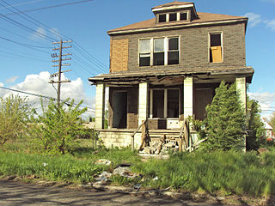Summary | Excerpt | Reviews | Beyond the Book | Read-Alikes | Genres & Themes | Author Bio

Critics' Opinion:
Readers' Opinion:
First Published:
Apr 2015, 352 pages
Paperback:
Mar 2016, 352 pages
 Book Reviewed by:
Book Reviewed by:
Rebecca Foster
Buy This Book
This article relates to The Turner House
In 2013, the city of Detroit declared bankruptcy. The decline of the automotive industry, the growth of the suburbs, unemployment, poverty, and high crime rate are all cited as factors in the city's decline. From a peak population of 1.85 million in 1950, the city shrank to around 700,000; it steadily leaked people to the Michigan suburbs or other parts of the country, especially after the 1967 riots. That amounts to a 60% drop in population. In 2013 the U.S. Department of Labor Bureau of Labor Statistics named Detroit's as the highest unemployment rate (23.1%) among the country's 50 largest cities.
 Over the period from 2007 to 2013, Detroit's property market crashed. One in five houses lay empty. Why? In many cases, residents found that their homes were worth less than what they still owed to the bank. Why continue paying off a $40,000 mortgage on a house worth only $4,000? (Such is the dilemma that faces the Turner children in Angela Flournoy's The Turner House.) The average sale price for a house in Detroit was $7,500 in 2009, but there are tales of people getting bargains of $500 or even $100. Nor was it uncommon for people to set fire to their own abandoned homes, reasoning that insurance payouts might outweigh a mortgage.
Over the period from 2007 to 2013, Detroit's property market crashed. One in five houses lay empty. Why? In many cases, residents found that their homes were worth less than what they still owed to the bank. Why continue paying off a $40,000 mortgage on a house worth only $4,000? (Such is the dilemma that faces the Turner children in Angela Flournoy's The Turner House.) The average sale price for a house in Detroit was $7,500 in 2009, but there are tales of people getting bargains of $500 or even $100. Nor was it uncommon for people to set fire to their own abandoned homes, reasoning that insurance payouts might outweigh a mortgage.
The good news is that Detroit came out of bankruptcy in December 2014, and the property market is rebounding. Some abandoned lots have been turned into community gardens. The nonprofit group Motor City Blight Busters, staffed by students and volunteers, demolishes derelict buildings and recycles the materials into other properties. The group has been around since 1988, when they undertook the rehabilitation of the Old Redford neighborhood. One demolition can cost up to $12,000 and generates 400 tons of rubble. Mayor Mike Duggan intends to set up a city-wide reclamation center so that the tons of rubble demolitions produced will stay out of landfills and create jobs for recyclers instead.
Reclaim Detroit, another nonprofit group, salvages house fittings and furnishings for resale. Some of the wood they have found (in the form of oak doors, cabinets, trunks, light fittings, and so on) is from the 1880s. So far the initiative has saved 50,000 tons of materials from landfill.
Detroit SOUP, founded in 2010, combines a social gathering and public works projects. For a $5 donation, attendees receive a light dinner and hear four-minute presentations about ideas for community development. At the end of the meal a vote is taken and the winning project receives the proceeds of the event. This crowdfunding approach has recently traveled to the other side of the world, in the form of Idea Fest Nepal. Winning ideas range from encouraging blood donation to increasing recycling.
As drastic as things might have appeared once, it looks like Detroit really is on the road to recovery although not quite out of the woods.
Picture of abandoned Detroit house by Notorious4Life
Filed under Places, Cultures & Identities
![]() This "beyond the book article" relates to The Turner House. It originally ran in April 2015 and has been updated for the
March 2016 paperback edition.
Go to magazine.
This "beyond the book article" relates to The Turner House. It originally ran in April 2015 and has been updated for the
March 2016 paperback edition.
Go to magazine.





The Funeral Cryer by Wenyan Lu
Debut novelist Wenyan Lu brings us this witty yet profound story about one woman's midlife reawakening in contemporary rural China.
Your guide toexceptional books
BookBrowse seeks out and recommends the best in contemporary fiction and nonfiction—books that not only engage and entertain but also deepen our understanding of ourselves and the world around us.